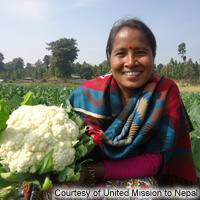United Mission to Nepal Integrated Community Development Project

Project Information
Utilizing media and mass mobilization to promote social programs for people living in remote areas.
Describe the need affecting community
UMN has identified the following groups of people as being the poorest people living in poverty (PPLP) within Nepal: a) people living with disabilities (PWD), b) children and adolescents, especially girls, c) women, especially single women, and d) Dalits (caste minorities), in addition to other six district specific PPLP based on UMN’s understanding of poverty. Poverty is understood by UMN as multi-dimensional and comes from a web of interrelated causes including: despair, oppression, injustice, inequity, conflict, shame, disrespect, ill-health, vulnerability, and environmental degradation. The incidence of poverty and injustice is high among these identified groups of people living in poverty. They have low level of access to public services and fundamental rights. They frequently face stigma and discrimination in the society leading to become more vulnerable with trauma and poor self-esteem. These PPLP are among the most disadvantaged groups in Nepal due to the practice of discrimination, and sometimes multiple discrimination such as on the grounds of their disability, poverty, caste or gender. Most of the poor children, especially girls, and PWD cannot complete full cycle of primary or secondary education due to the high incidence of poverty, stigma and discrimination. Women and girls in Nepal live in a patriarchal society and therefore the gender gap is still significantly wide. They have limited access to property, public services and decision making process both at home and in community or society. Women and girls suffer sexual, physical and psychological violence more than men and boys. The Dalits in Nepali society are socially and economically marginalized and are still treated as untouchables facing many forms of social discrimination. Almost half of Nepal’s Dalits live below the poverty line. Dalits either have low landholding or have no land, and lag behind in their income, education, health and other human development indicators.
How will this Advance project help to address the need?
UMN will focus on the poorest people living in poverty (PPLP), for example people with disabilities; children and adolescents, especially girls; women, especially single women; Dalits (socially and economically marginalized community groups) and other disadvantaged groups identified according the local context such as farmers with low landholding or landless, elderly people, ethnic minorities, people living with HIV and AIDS (PLHA) and so on. UMN will empower poor and marginalized people and build capacity of community groups, civil society organizations and government institutions. We focus on encouraging and building their capacity to have a more holistic approach to mission, through meeting the needs of the poor and disadvantaged in the communities. The Teams of UMN will facilitate the process community transformation addressing root causes of poverty thereby working in sustainable livelihoods, health, education, peace building, integral mission (church and development) and good governance. We will consider gender, conflict sensitivity and environment and climate change in all the work we do.
Describe the primary goal of the project
To contribute to the fullness of life for all in a transformed Nepali society.
Describe the change you would like to see in the community as a result of this Advance project
UMN ultimately wishes to see the communities transformed in its full potential to experience fullness of life. Specifically, we would like to see: – Children and adolescents enabled to utilize age-appropriate quality education and healthcare with food security, without discrimination by caste, gender, marital status or ability. – Improved access to quality (child-friendly) formal and other appropriate educational opportunities. – Improved livelihoods and well-being of PPLP. – Strengthened/ improved harmonious and just power relationships in the communities. – Strengthened civil society organizations and institutions, including equipping of Christian organizations, so that they could be effective in meeting the needs of PPLP. – Equipped human resource with necessary leadership and technical skills for serving to the PPLP.

